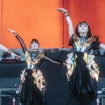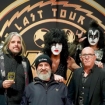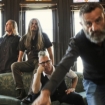This feature was originally published in 2008.
Primitive by Tool standards, 1991's Opiate is still more developed and expressive than most alt-metal records of the era. Driven by youthful aggression and contempt, the songs lunge and hammer in repetitive, staccato bursts, but beneath the raw savagery is a tension that builds through clench-and-release rhythms, textural guitar waves, and vocals as pained as they are pissed. In his lyrics, Maynard James Keenan sings about religion ("Opiate"), retribution ("Jerk-Off"), and reactionary hostility ("Hush") in raw, unrefined phrases. Despite its simplicity, Opiate features some clever arrangements that hint at the progressive path the band would later take. In the midsection of "Sweat," fast, double-bass drumming clashes with abrupt guitar blasts and an angular hook before the players latch back into the main riff, and on the title track, the band tempers its hostility with chiming, atmospheric guitar and eerily echoing vocals. The 27-minute EP features two live recordings sandwiched between four studio cuts but hardly suffers for its unconventional construction. There's also a goofy, psychedelic hidden track, "The Gaping Lotus Experience," that reflects the band's bizarre sense of humor.
DANNY CAREY The vibe of the band was different at that point. We hadn't really defined the parameters between us or the way we interacted, and that made our sound more raw. There were a lot of boundaries being leapt over and lots more learning experiences happening at the same time, which was really exciting. Musically, we were just trying to find out what our personality was as a band. Sometimes I listen to my drumming from back then and it sounds like I'm overplaying, but that was the fun of it and that's sort of what turned us into the band that we are.
MAYNARD JAMES KEENAN I was flying by the seat of my pants. My musical approach came from a lot of the frustration of living in L.A., busting ass on video sets trying to survive. The music was all about emoting and releasing that primal scream. I was a big fan of Joni Mitchell and the Swans, so I related more to that close-to-the-heart, personal lyric style. To me, songs really are all about the story, and that's why people respond to them. The music gets under your skin, for sure, but it's the story that puts the hook in and keeps you there.
CAREY At the time there were all these hack musicians playing crap that any garage band could write. And when they made a video, they had no choice but to show somebody's pretty face or make them look cool and dance around like a monkey, which seemed so embarrassing. So we made a conscious effort to put our art first and make it about the music and not the musicians. And because our faces weren't plastered over everything, people went, "Oh, there's this mystique about Tool." That continues to this day, but I think it's great that I can still go to the grocery store and not get noticed.
KEENAN It wasn't hard for us to get signed. We were four pretty pissed-off, relatively talented musicians, so we got a record deal after about seven shows. Of course, Nirvana helped open the door because after they hit, most music guys around town were chasing their tails trying to find the next big thing. And here we come along, and we don't sound like most of the other stuff going on, so for them, they don't really get it, but they knew that it was different and that Nirvana was selling lots of records, so they knew they had to grab whatever it was, just in case.
ADAM JONES The most important thing for us at that point was to have creative control. When we got signed, we went, "OK, if we take less money can we have control of the music?" And the label went, "Yeah, no problem!" And we said, "If we take even less money can we have final say over the videos?" And so on. But there was still a lot of banging heads with the record company, because they still wanted to do things in the traditional way. They'd go, "Well, if you're not gonna be in your video, we're not gonna pay for it." And we'd say, "What do you mean? We're supposed to have control." We signed a three-album deal with them and the first thing we wanted to do was an EP. And they went, "Yeah, do an EP. That'd be great!" And we kind of got burned from it, because it wasn't a full album so it didn't count on our contract, which is why they were so agreeable when we first suggested it.
CAREY We were broke at that time, and we knew that even if the record company was willing to pay for studio time, we were going to have to pay it all back. So we recorded Opiate in, like, four days because we knew if we were there longer it was gonna get expensive. But we also had a live recording and we were happy with the way it sounded. So we thought, Well, let's just mix the live tracks and add them to the record. We had been playing those songs live for a year, which is a luxury we don't have anymore. Now we have to keep everything secret, because we don't want to have people hearing our songs on bootlegs all over the Internet. I wish we could still go out and play our songs live before we track them, but those days are gone.
KEENAN What I remember most about Opiate was just being in a space where other people had done things. I would look at the walls and see all the platinum records and that was inspiring, but it was also depressing, because you're taking this very first step in this life you're about to embark on, and you're looking at the wall going, Well, wait a minute. Where are these guys now? What happened to them? So seeing these gold records on the wall from people we hadn't heard of, we kind of formed — unconsciously and in an unspoken way — a modus operandi for how we were gonna be, assuming that any second this thing was gonna end and we were gonna have to go back to our day jobs. And that modus operandi was to pursue our art and not be enamored or intoxicated by the unimportant stuff.
JONES A lot of the songs for Undertow were already written when we did Opiate, but we felt like no one would take us seriously unless we recorded only our most aggressive, in-your-face songs and put them out there at one time. And I think that got us typecast as a metal band. It's kind of funny, because the song I thought was the least aggressive, "Opiate," was the more popular one on the record.
KEENAN After the record came out, we'd find ourselves in someplace like Akron, Ohio, playing a club that could hold about 500 people, but there are only five people there and those are the guys that are gonna play after you. That was awkward, but it didn't really matter to us because we were still getting to know each other. And in a way, not having any pressure to perform to anybody, you can just kind of explore your space right there. And as time went on it became more about how we connected onstage and less and less about how anyone in the audience was reacting.












